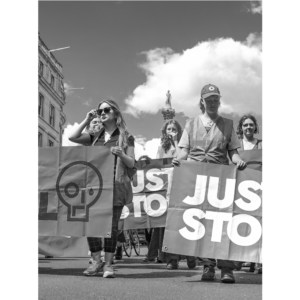Activists from the campaign group climbed Rishi Sunak’s £2 million grade-II listed manor home in North Yorkshire on Thursday, August 3 and draped it with black cloth in protest of the PM’s plans to grant new licences for oil and gas extraction in the North Sea.
The PM, who was not home at the time but in California on holiday with his family, has not publicly spoken on the situation. But, Environmental Secretary Thérèse Coffey has ordered civil servants working in the Department for the Environment, Food and Rural Affairs (Defra) to “immediately cease engagement with Greenpeace” on Friday, August 4.
The decision, which was revealed by The Guardian’s senior political correspondent Aubrey Allegretti, came just 12 hours after the protest and also involved planned meetings and communication with the group being “axed until further notice.”
The campaign group, which defines itself as a movement of people who are ‘passionate about defending the natural world from destruction’, subsequently backed up its position on the demonstration, branding it “entirely peaceful.”
Greenpeace’s co-executive director Will McCallum told NationalWorld: “This isn’t about the government engaging with Greenpeace, it’s about them engaging with the world around them.”
Co-executive director Areeba Hamid added in an interview with Sky News that it was a “proportionate response to a disastrous decision” and stated that it was planned “carefully and meticulously” for the group to carry out the stunt only while Sunak was away from home.
The protest is only the latest in a long line of controversial climate protests deployed by social movements. These include the Last Generation (Ultima Generazione) protest of staining the Trevi Fountain black earlier this year and Just Stop Oil activists throwing soup at Van Gogh’s ‘Sunflowers’ in 2022, both met with mixed reactions.
With the latest Intergovernmental Panel on Climate Change report that countries are far from keeping global warming below 2°C, the desire for climate action is high.
Consequently, climate activists are likely to deploy increasingly radical tactics in the future, but Greenpeace’s recent actions “raise concerns for everyone” said health minister Maria Caulfield. “Most people have seen some disruption from protesters.”
The actions of activist groups have gained significant amounts of criticism, with a recent article in The Telegraph denouncing the Greenpeace demonstration as “a home invasion… dressed up in thin political finery.”
Speaking with the MailOnline, Tory MP for Dartford, Gareth Johnson, a former lawyer and justice minister shared how he believes groups like Just Stop Oil should be labelled terrorist organisations.
And in reaction to other protests, a witness to the Van Gogh soup incident stated in an interview with The Guardian that activists “may be trying to get people to think about the issues”, but “all they end up doing is getting people really annoyed and angry.”
But, LSE researchers found that “evidence shows that environmental direct action does not automatically ‘tarnish’ the entire movement.” Conversely, they discovered that “voters see the use of radical tactics as an understandable response to the failure of moderate tactics.”
Author’s Analysis:
Researchers also point to the “radical flank effect”, where radical actions in a social movement can increase support and identification with more moderate or ‘mainstream’ actions, effectively advancing the entire movement’s agenda.
Perhaps most importantly, extreme demonstrations have the effect of garnering attention. A single video of the Van Gogh Soup Protest alone gained more than 760,000 views. Attention is likely to be much higher when extreme tactics are utilised compared to more traditional methods.




